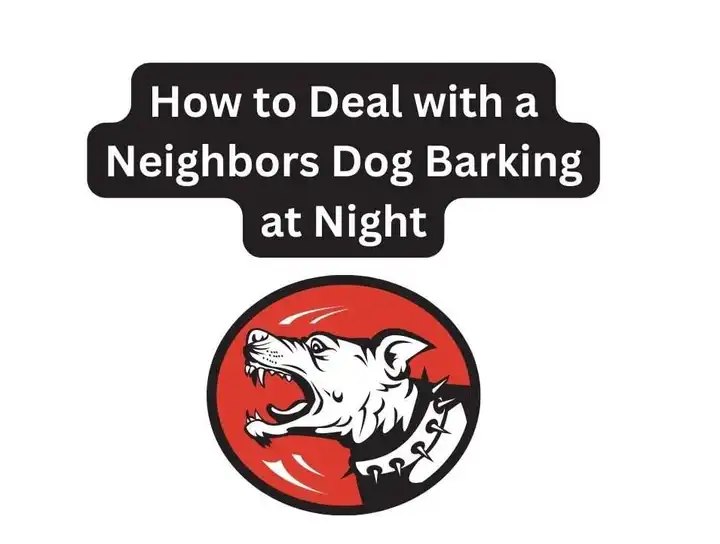Neighbours Dog Barking at Night? Here’s Your Action Plan – Many of us have encountered a scenario where we’re jolted awake or prevented from falling asleep due to the incessant barking of a neighbor’s dog. The question of how to address a neighbours dog barking at night is one that countless individuals grapple with, often leading to sleepless nights and rising frustrations.
How to Deal with a Neighbors Dog Barking at Night: Practical Tips and Solutions

Neighbours Dog Barking at Night The scope of the problem extends beyond a mere nocturnal noise disturbance. When the peacefulness of your night is consistently interrupted by a neighbor’s dog barking, it becomes an issue of communal respect, public health, and quality of life. Navigating this situation is crucial, balancing the need for peace with a compassionate understanding of the factors causing the dog’s disruptive behavior.
Recognizing the Root Causes
Understanding the causes behind your neighbor’s dog barking at night is the first step to resolving the issue. Dogs bark for various reasons, often quite different from why humans communicate. Identifying these can provide insight and help determine the best course of action.
A. Loneliness and Boredom
A common cause of excessive barking, particularly at night, is loneliness and boredom. According to the American Society for the Prevention of Cruelty to Animals (ASPCA), dogs are inherently social animals and may vocalize their distress when left alone for extended periods. Night barking can be an outlet for their unspent energy or even a plea for attention.
B. Hunger or Thirst
Night barking could also be an indicator of hunger or thirst. According to Dr. Jill Goldman, a certified applied animal behaviorist, dogs fed early in the evening might become hungry during late-night hours, leading to nocturnal barking.
C. Illness or Pain
Nocturnal barking can be a sign of distress caused by illness or pain. Dr. Wailani Sung, a veterinary behaviorist, suggests that older dogs or those with certain medical conditions may experience discomfort that disrupts their sleep, causing them to bark.
D. Nocturnal Animals
Another common cause of night barking is the presence of nocturnal animals. Dr. Suzanne Hetts, a certified applied animal behaviorist, explains that raccoons or cats can trigger a dog’s instinct to bark. The result is a potential cacophony that can disrupt an entire neighborhood.
E. Inadequate Training
Inadequate training can also contribute to a dog’s nocturnal barking. According to the ASPCA, dogs that haven’t been taught proper “quiet” commands or those that are inadvertently rewarded for barking may struggle with excessive vocalization, including during night hours.
Recognizing these root causes can provide a starting point for a conversation with your neighbor and potential ways to address and resolve the issue. Understanding why a dog might be barking at night also fosters empathy for the animal, an important aspect of maintaining a harmonious neighborhood environment.
Steps Towards a Solution
You can consider various solutions once you understand the potential causes behind the nocturnal barking. You can abide by several actions to manage the problem of a neighbor’s dog barking at night, ranging from direct communication to self-help strategies and external assistance.
A. Open Communication: Reaching Out to Your Neighbours
The first step towards solving the problem should be an open and respectful dialogue with your neighbor. Recognize that they might not be conscious of the issue, especially if they are heavy sleepers or not at home during the dog’s barking episodes. It’s important to approach this conversation with understanding and tact, focusing on finding a solution together rather than laying blame.
B. Leveraging Local Authorities and Regulations
If open communication fails to solve the issue, your next step could be investigating local noise ordinances or animal control regulations. In many areas, continual dog barking is considered a noise violation, and local animal control agencies or law enforcement may be able to assist. Before taking this step, document the barking occurrences thoroughly to provide evidence of the ongoing issue.
C. Considering Mediation or Legal Action
It would help if you considered mediation or legal action in severe cases that are severely impacted. Professional mediators can facilitate a conversation between you and your neighbor to find a mutually beneficial resolution. It should be a final alternative and only considered if the issue seriously affects your well-being and all other attempts at resolution have failed.
Here are some details on how and when to pursue these actions:
Mediation:
- Mediation involves a neutral third party facilitating a conversation between you and your neighbor to find a mutually beneficial resolution.
- Mediation if open communication has failed, or if the issue requires a more structured approach is advisable.
- To initiate the process, you can search for professional mediators or community mediation programs.
- Mediation can be less adversarial and more cooperative than legal action, fostering better relationships between neighbors.
Legal Action:
- Considered a last alternative when all other shots at resolution have failed, and the impact on your well-being is severe.
- Consult local noise ordinances or animal control regulations to understand your rights and the legal framework regarding excessive dog barking.
- Document the barking occurrences thoroughly, noting dates, times, and duration to provide evidence of the ongoing issue.
- Seek legal advice from a qualified attorney specializing in neighbor disputes or animal-related matters. They can guide you on the laws applicable to your situation and the steps in filing a legal complaint.
- Remember that legal action can be lengthy and costly, and the outcome is not guaranteed. Before pursuing this path, consider the potential impact on your relationship with your neighbor and the overall community.
These steps can help ensure that you’re approaching the issue of your neighbor’s dog barking at night systematically and effectively, increasing the chances of a successful resolution.
Neighbours Dog Barking at Night With Self-Help Methods

Neighbours Dog Barking at Night – While pursuing dialogue with your neighbor or potential assistance from local authorities, there are several self-help strategies you can implement to alleviate the problem. These approaches can help to minimize the disturbance of a neighbor’s dog barking at night and improve your overall well-being.
A. Soundproofing Your Home
Soundproofing measures in your home can go a long way in blocking out the sound of a barking dog. Consider investing in soundproofing options like insulating windows and walls or installing noise-reducing curtains or blinds. These modifications not only help to mitigate the noise from barking dogs but also from other outdoor disturbances.
B. Using Noise-Cancelling Devices
Technological advances have led to the development of devices that can help minimize noise intrusion effectively. Noise-canceling headphones or earplugs can provide significant relief, especially during sleep hours. Similarly, white noise machines or apps that generate soothing sounds can mask the disruptive noise of barking, promoting better sleep and relaxation.
C. Practicing Mindfulness and Meditation
Coping with noise disturbances isn’t just about physical modifications or technology. There’s also a mental component involved. Practicing mindfulness and meditation can help manage the stress associated with a neighbor’s dog barking at night. These practices can aid in fostering a sense of calm and promoting better sleep, despite external noise.
While these self-help strategies might not eliminate the problem of a neighbor’s dog barking at night, they can significantly reduce its impact on your life, providing some much-needed relief. At the same time, you work towards a more permanent solution.
Alternative Approaches

If traditional routes of resolving the issue don’t work, or if you want to explore every possible avenue, there are several alternative approaches to consider when dealing with a neighbor’s dog barking at night. These approaches may involve more of the community or professional intervention.
A. Involving the Community
If the barking dog is also bothering other neighbors, banding together to address the issue can be a powerful approach. It doesn’t mean confronting the dog owner as a large group, which could come off as intimidating, but rather collectively communicating your concerns. A group letter signed by multiple neighbors or a community meeting might prompt the dog owner to take the issue more seriously.
B. Hiring a Professional Dog Trainer or Behaviorist
If your neighbor is open to it, suggesting the assistance of a professional dog trainer or behaviorist can be beneficial. These professionals can provide guidance and implement strategies to curb the barking. They may be able to identify specific triggers causing the dog’s nocturnal barking and provide effective, tailored solutions.
These alternative approaches expand the range of possible solutions and promote a more community-centric way of resolving issues. It’s important to remember that each situation is unique, and what works for one might not work for another. A broad spectrum of potential solutions can increase the likelihood of finding one that works for your circumstance.
Determining If a Barking Dog’s Needs Are Being Met

Neighbours Dog Barking at Night – Ensuring a dog’s needs are adequately met is essential to managing and reducing barking, especially at night. Factors to consider include exercise, mental stimulation, and socialization. Here’s how to evaluate if these needs are being met:
A. Exercise
One of the first aspects to look at is the dog’s exercise routine. An adequately exercised dog will likely be more content and less prone to disruptive behavior like excessive barking. Look for signs of regular walks, playtime, or outdoor activities. A constantly indoors or lazy dog may need more physical exercise.
B. Mental Stimulation
Like humans, dogs require mental stimulation. Lack of such can lead to boredom, often manifesting as disruptive behaviors such as barking or chewing. Enrichment toys, interactive games, or training sessions can provide mental stimulation. If these elements seem absent from the dog’s routine, it could signify unmet mental needs.
C. Socialization
Dogs are inherently social creatures and thrive on interaction. Regular socialization with other dogs or humans is important for their emotional health. Signs of adequate socialization include:
- Regular visits to a dog park.
- Playdates with other dogs.
- Positive interactions with family members and visitors.
If the dog appears anxious or aggressive around other dogs or people, it may indicate insufficient socialization.
D. Basic Needs
Check if the dog’s basic needs are met, such as a balanced diet, regular veterinary care, and a clean and safe living environment. Ignoring these needs can lead to health issues, which can cause behavioral problems like excessive barking.
E. Signs of Stress or Anxiety
Dogs may bark excessively due to stress or anxiety. Look for signs of stress in the dog, such as constant pacing, excessive grooming, or destructive behavior. These could indicate that the dog’s emotional needs are not being properly addressed.
F. Professional Assessment
If you need clarification on whether a dog’s needs are being met, consider enlisting the help of a professional. Veterinarians, dog trainers, or animal behaviorists can provide expert guidance and assess if a dog’s needs are adequately addressed.
Ensuring that a dog’s fundamental needs for exercise, mental stimulation, and socialization are met is key to maintaining their well-being and preventing disruptive behaviors like nighttime barking.
The Health Effects of Sleep Disturbance and Prolonged Exposure to Noise
Exposure to continuous noise, especially at night, can profoundly affect health. From sleep disturbance to mental health implications, the consequences are far-reaching and should not be ignored.
A. Impact on Sleep
Noise disturbances, such as a neighbor’s dog barking at night, can severely impact the quality and quantity of sleep. Interrupted sleep can lead to sleep deprivation, characterized by excessive daytime sleepiness, difficulty focusing, and impaired memory. Chronic sleep deprivation can escalate to more serious health issues such as weakened immunity, weight gain, and an increased risk of developing conditions like diabetes, cardiovascular diseases, and mood disorders.
B. Cardiovascular Health
Chronic noise exposure has been linked to a higher risk of cardiovascular diseases. Studies have suggested that noise pollution, particularly at night, can induce a stress response, causing the release of stress hormones that raise heart rate and blood pressure. Over time, this can lead to hypertension, heart disease, stroke, and other cardiovascular conditions.
C. Mental Health
Noise pollution can significantly affect mental health. Prolonged exposure can cause or exacerbate stress, anxiety, and depression. The constant irritation from noise can lead to mood swings, decreased cognitive function, and poor concentration. In extreme cases, it may even contribute to more severe psychological disorders.
D. Hearing Impairment
Continuous exposure to loud noise can lead to noise-induced hearing loss. While a barking dog may not produce noise at a level that causes immediate hearing damage, cumulative exposure over an extended period can potentially impact hearing health.
E. Effect on Children
Children are particularly vulnerable to the effects of noise pollution. Studies have found that excessive noise exposure can impact children’s cognitive development, affecting learning, reading comprehension, and memory. Moreover, sleep disturbances in children can also lead to behavioral issues.
F. Overall Quality of Life
Noise pollution and disrupted sleep can significantly lower the overall quality of life. It can lead to decreased productivity, impaired social interactions, and general dissatisfaction with life.
Sleep disturbances and prolonged noise exposure can have extensive health effects. It’s important to address these issues promptly and seek ways to mitigate the impact of such disturbances. It may include strategies such as soundproofing your home, using noise-canceling devices, and advocating for noise control measures in your community.
Final Thoughts
Navigating the issue of a neighbor’s dog barking at night can be a challenging task. However, with patience, understanding, and a systematic approach, finding a solution that works for everyone involved is possible.
Patience and Persistence: Key to Resolving the IssueAddressing this problem requires patience and persistence. It’s crucial to remember that change may take time to occur. The dog may require time to adjust to new routines or training, and neighbors may need time to implement changes or seek professional help. Keep open lines of communication throughout this process, continually expressing your concerns respectfully.
When to Seek Professional HelpDespite your best efforts, if the barking continues unabated and severely impacts your quality of life, it may be time to seek professional advice. Depending on the severity of the issue, this might range from legal counsel to a consultation with a noise reduction specialist or even medical help if the situation is causing you significant stress or sleep deprivation.
Remember, it’s not just about achieving quiet nights; it’s about maintaining a harmonious living environment for everyone. After all, neighborhoods are shared spaces, and every resident, human or canine, has a right to live comfortably within them. Approaching the issue with empathy and understanding and a clear action plan can help ensure a peaceful resolution for all parties involved.



